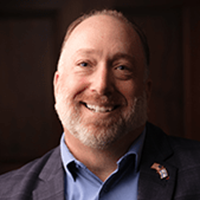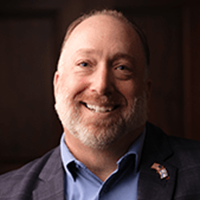4 Keys to Smart Financial Planning
Information overload can trip up good decision making. To protect your retirement security, you’ve got to stay focused.


Profit and prosper with the best of Kiplinger's advice on investing, taxes, retirement, personal finance and much more. Delivered daily. Enter your email in the box and click Sign Me Up.
You are now subscribed
Your newsletter sign-up was successful
Want to add more newsletters?

Delivered daily
Kiplinger Today
Profit and prosper with the best of Kiplinger's advice on investing, taxes, retirement, personal finance and much more delivered daily. Smart money moves start here.

Sent five days a week
Kiplinger A Step Ahead
Get practical help to make better financial decisions in your everyday life, from spending to savings on top deals.

Delivered daily
Kiplinger Closing Bell
Get today's biggest financial and investing headlines delivered to your inbox every day the U.S. stock market is open.

Sent twice a week
Kiplinger Adviser Intel
Financial pros across the country share best practices and fresh tactics to preserve and grow your wealth.

Delivered weekly
Kiplinger Tax Tips
Trim your federal and state tax bills with practical tax-planning and tax-cutting strategies.

Sent twice a week
Kiplinger Retirement Tips
Your twice-a-week guide to planning and enjoying a financially secure and richly rewarding retirement

Sent bimonthly.
Kiplinger Adviser Angle
Insights for advisers, wealth managers and other financial professionals.

Sent twice a week
Kiplinger Investing Weekly
Your twice-a-week roundup of promising stocks, funds, companies and industries you should consider, ones you should avoid, and why.

Sent weekly for six weeks
Kiplinger Invest for Retirement
Your step-by-step six-part series on how to invest for retirement, from devising a successful strategy to exactly which investments to choose.
The world of finance always has been a busy, noisy place — and right now it’s bordering on cacophony.
Besides all the usual financial decisions that need to be made (Buy! Sell! Save! Stocks! Bonds! Annuities!), every event — real or predicted — seems to turn up the volume … and the worry.
For people who are close to retirement, all this chatter is particularly scary, as they try to protect every dollar they’ve put away. For some, it’s paralyzing; they can’t make a move because it might be a misstep. Others seem to shift with the wind — or, at least, the latest sound bite. The more information they receive, the more they wonder how each bit of news will affect their portfolio.
From just $107.88 $24.99 for Kiplinger Personal Finance
Become a smarter, better informed investor. Subscribe from just $107.88 $24.99, plus get up to 4 Special Issues

Sign up for Kiplinger’s Free Newsletters
Profit and prosper with the best of expert advice on investing, taxes, retirement, personal finance and more - straight to your e-mail.
Profit and prosper with the best of expert advice - straight to your e-mail.
I get it. I do. But there is a way to take the noise down a notch, and perhaps even the fear.
Plan with a purpose. If you’re trying to get to retirement, or you’re already there and you don’t want to fail, you have to set up your portfolio in a way that makes sense for you. Not your friends or co-workers. Not the guy at your golf club. Not the woman who called into The Suze Orman Show and loved her response. Just you.
Now, I’m not saying that you shouldn’t listen to the people out there giving investing advice. What I’m suggesting is that you do it with a filter, taking into account your retirement horizon, your needs and your family’s needs, your morals and your ethics.
Focus on what you can control. Stock prices and interest rates tend to affect the choices investors make, even though they have no control over them. But what you can manage is your personal risk. Once you’ve moved from the accumulation phase to the preservation/distribution phase of life, your mindset should shift from the return on your money to the return of your money.
It’s like owning real estate and having a renter who pays you on time every month. The value of your property may go up or down, but you’re not going to sell it if you don’t have to — you’re sticking with that consistent rent check.
For most, what the value of an individual stock is on any given day isn’t that important — it’s consistency that counts. With investing, your portfolio should be designed to generate income in your retirement.
Look to the long term. There will always be events that pop up to rattle investors and affect the market, good or bad. With a new president, there could be changes in policy regarding interest rates, the Department of Labor’s fiduciary rule and estate tax laws — just to name a few. Instead of investing in reaction to these events, stick to what feels right.
For example, if during estate planning you bought a big life insurance policy to cover taxes, and the new administration ends up getting rid of the estate tax, was the life insurance unnecessary? Maybe not. It’s still going to provide money to your heirs to cover a lot of expenses.
The same holds true for the market. Let’s say you set up your portfolio to be less susceptible to volatility while your buddy hangs onto a plan that has far more risk. If the market has a good quarter and he brags about his return, it will be tough not to wonder if you should have followed his lead. Don’t. He might not be in the same place in his life. He might have other sources of income to depend on if the market experiences a downturn. (And when the market does take a downturn, you probably won’t hear about his losses.)
Choose an adviser who fits your investing style. If you like to travel at 35 mph, you probably won’t be happy with a driver who goes 55 or faster. The same holds true for your finances. It’s about an investment philosophy and a mutual understanding of what you’re trying to accomplish.
My clients want me to have my finger on the market’s pulse, to make adjustments when necessary — always keeping their risk tolerance in mind — and to keep them informed. That’s the idea of working with a fiduciary.
If your adviser says “it’s only a paper loss” or “it will come back,” you may not be investing with a low-volatility approach. Don’t be afraid to look elsewhere or, at least, to get a second opinion.
Alan Becker is founder, president and chief executive officer of Retirement Solutions Group. He is also the host of the “Retire Right with Alan Becker” radio show. A U.S. Navy veteran, Becker has been in the insurance industry for 18 years.
Kim Franke-Folstad contributed to this article.
Retirement Solutions Group and RSG Investments are independent financial services firms that, in concert, create retirement strategies using a variety of investment and insurance products. Neither the firm nor its representatives may give tax or legal advice. Investment advisory services offered through AE Wealth Management, LLC. Investing involves risk, including the loss of principal. No investment strategy can guarantee a profit or protect against loss in periods of declining values. Any references to protection benefits or lifetime income generally refer to fixed insurance products, never securities or investment products. Insurance and annuity product guarantees are backed by the financial strength and claims-paying ability of the issuing insurance company.
Profit and prosper with the best of Kiplinger's advice on investing, taxes, retirement, personal finance and much more. Delivered daily. Enter your email in the box and click Sign Me Up.

Alan E. Becker is the President and CEO of RSG Investments, LLC, with multiple locations in the Kansas City, Missouri, metro area. After his service in the Navy, Alan entered the financial industry in 1998. He began as an insurance agent holding licenses in Kansas, Texas and Missouri before passing his Series 65 securities exam to become an Investment Adviser Representative. He has since built RSG Investments from the ground up to serve as an independent source of comprehensive financial advice capable of helping individuals "to and through" their unique retirement journey.
-
 4 Estate Planning Documents Every High-Net-Worth Family Needs
4 Estate Planning Documents Every High-Net-Worth Family NeedsThe key to successful estate planning for HNW families isn't just drafting these four documents, but ensuring they're current and immediately accessible.
-
 Love and Legacy: What Couples Rarely Talk About (But Should)
Love and Legacy: What Couples Rarely Talk About (But Should)Couples who talk openly about finances, including estate planning, are more likely to head into retirement joyfully. How can you get the conversation going?
-
 How to Get the Fair Value for Your Shares in This Situation
How to Get the Fair Value for Your Shares in This SituationWhen a sale of substantially all corporate assets is approved by majority vote, shareholders on the losing side of the vote should understand their rights.
-
 The 4 Estate Planning Documents Every High-Net-Worth Family Needs (Not Just a Will)
The 4 Estate Planning Documents Every High-Net-Worth Family Needs (Not Just a Will)The key to successful estate planning for HNW families isn't just drafting these four documents, but ensuring they're current and immediately accessible.
-
 Love and Legacy: What Couples Rarely Talk About (But Should)
Love and Legacy: What Couples Rarely Talk About (But Should)Couples who talk openly about finances, including estate planning, are more likely to head into retirement joyfully. How can you get the conversation going?
-
 How to Get the Fair Value for Your Shares When You Are in the Minority Vote on a Sale of Substantially All Corporate Assets
How to Get the Fair Value for Your Shares When You Are in the Minority Vote on a Sale of Substantially All Corporate AssetsWhen a sale of substantially all corporate assets is approved by majority vote, shareholders on the losing side of the vote should understand their rights.
-
 How to Add a Pet Trust to Your Estate Plan: Don't Leave Your Best Friend to Chance
How to Add a Pet Trust to Your Estate Plan: Don't Leave Your Best Friend to ChanceAdding a pet trust to your estate plan can ensure your pets are properly looked after when you're no longer able to care for them. This is how to go about it.
-
 Want to Avoid Leaving Chaos in Your Wake? Don't Leave Behind an Outdated Estate Plan
Want to Avoid Leaving Chaos in Your Wake? Don't Leave Behind an Outdated Estate PlanAn outdated or incomplete estate plan could cause confusion for those handling your affairs at a difficult time. This guide highlights what to update and when.
-
 I'm a Financial Adviser: This Is Why I Became an Advocate for Fee-Only Financial Advice
I'm a Financial Adviser: This Is Why I Became an Advocate for Fee-Only Financial AdviceCan financial advisers who earn commissions on product sales give clients the best advice? For one professional, changing track was the clear choice.
-
 I Met With 100-Plus Advisers to Develop This Road Map for Adopting AI
I Met With 100-Plus Advisers to Develop This Road Map for Adopting AIFor financial advisers eager to embrace AI but unsure where to start, this road map will help you integrate the right tools and safeguards into your work.
-
 The Referral Revolution: How to Grow Your Business With Trust
The Referral Revolution: How to Grow Your Business With TrustYou can attract ideal clients by focusing on value and leveraging your current relationships to create a referral-based practice.